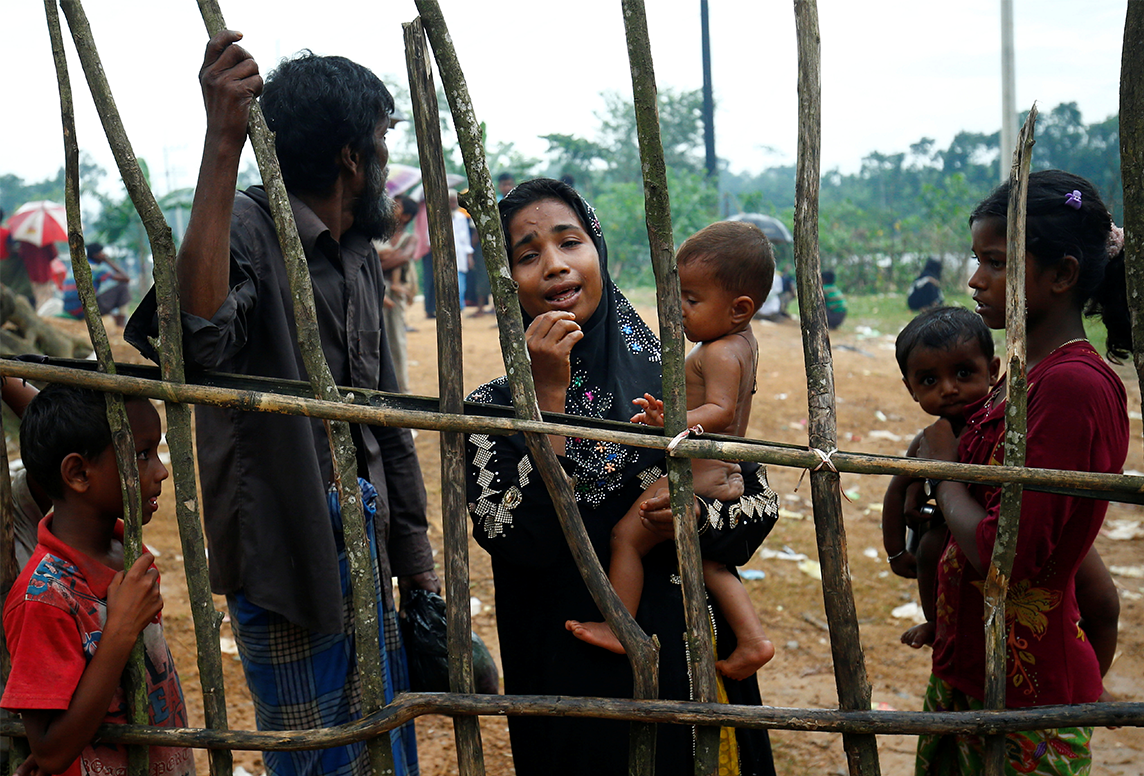Monday, September 25, marks one month since roughly 430,000 Rohingya muslim men, women and children began fleeing the Rakhine State in Myanmar and flooding into neighboring Bangladesh. Myanmar's de facto leader Aung San Suu Kyi has faced mounting international criticism for failing to condemn what the United Nations has called "textbook ethnic cleansing."
Eurasia Group's Southeast Asia expert
Peter Mumford takes stock of where the roughly 1.1 million Rohingya Muslims stand today and of what the trials traumas of the past month can tell us about what awaits them in the months and years to come.
The UN Human Rights chief has now accused Myanmar of a “textbook example” of ethnic cleansing. Help us with some context. Who are the Rohingya? Are the tensions between Rohingya, Buddhists and the state based on religion, ethnicity, both or something else? How long have these tensions existed?
The Rohingya are a Muslim group of South Asian descent mostly confined to the northern part of Rakhine State in the west of Myanmar, bordering Bangladesh. There were an estimated 1.1 million Rohingya in Myanmar before the recent crisis; another million Rohingya are spread throughout the world, primarily across Bangladesh, Saudi Arabia and Malaysia.
The Myanmar government—and most of the Myanmar population—refuse to recognize the Rohingya as one of the country's diverse ethnic groups (of which 135 are officially recognized), referring to them instead as “Bengalis.” Myanmar's citizenship law states that only those groups that resided within Myanmar prior to the first Anglo-Burmese War in 1824 are considered indigenous and automatically qualify for citizenship. While some Rohingya claim ancestry that dates back five or more centuries, the majority migrated during Britain's colonial rule (1824-1948). The law does not explicitly state the Rohingya cannot gain citizenship, but it is used to that effect.
Current tensions have both ethnic and religious dimensions. In 2012, communal violence erupted between the ethnic Rakhine, who are Buddhist, and the Muslim Rohingya. About 200 people were killed and 140,000 displaced, mostly Muslim. Of these, 120,000 remain in displacement camps. Following this conflict, many communities across Rakhine have been segregated. Attacks by the insurgent Arakan Rohingya Salvation Army last October on police and military checkpoints in Rakhine triggered a major crackdown by Myanmar's military; this has been accompanied by accusations of widespread rape, torture and murder of the Rohingya.
Current tensions have both ethnic and religious dimensions
This latest intensification of the crisis was prompted by accusations, fueled in part by the government, that Rohingya insurgents murdered eight civilian Buddhists at the beginning of August. That led to a sharp response from the Myanmar army, triggering the latest mass exodus of Rohingya.
How is this crisis likely to play out for Myanmar? Do they lose international aid? Or is China the big investor here and oblivious to this story?
The Myanmar government is coming under heavy international criticism, particularly from majority Muslim nations such as Malaysia and Turkey, as well as Bangladesh, which is receiving most of the refugees. Countries in the West have also widely criticized the Myanmar government's response (or lack thereof) to the situation, and the plight of the Rohingya has severely dented the international standing of Nobel laureate and the country's de factor leader, Aung San Suu Kyi. She is unable to rein in the military, which remains very influential despite the country's transition to democracy, and she is also under pressure from increasing anti-Rohingya sentiment and rising Buddhist nationalism among much of the country's population—more powerful forces at play than international criticism. Her critics argue this shouldn't prevent her government from doing more to prevent/solve the humanitarian crisis.
Countries in the West have also widely criticized the Myanmar government's response (or lack thereof) to the situation, and the plight of the Rohingya has severely dented the international standing of Nobel laureate and the country's de factor leader, Aung San Suu Kyi
Increasingly strained international relations will further intensify Myanmar's pivot to China, which already provides around a quarter of all FDI into the country and has been notably less critical of the government's handling of the current crisis.
What does it mean for Southeast Asia generally? Does it raise risks of ethno-religious violence elsewhere?
The violence will cause significant tension within Southeast Asia, particularly with majority Muslim countries Malaysia and Indonesia. The weak collective response of the Association of Southeast Asian Nations (ASEAN) to one of the worst humanitarian crises of recent times demonstrates how ineffective the bloc is in responding to regional political/security/social challenges—in large part because of strict adherence to its principle of non-interference in member states' domestic affairs.
The Rohingya crisis has played into the domestic politics in Malaysia and Indonesia. Malaysian Prime Minister Najib Razak has been very vocal in criticizing the treatment of the Rohingya, in part because it helps his efforts to shore up support among Muslim Malays ahead of general elections, expected later this year or early in 2018. Opponents of President Joko “Jokowi” Widodo in Indonesia have argued his government has been slow to respond and that this is further proof that the president's Muslim credentials are not strong enough, at a time of rising Muslim populism in the country. However, Jokowi has in fact dispatched his foreign minister to meet with leaders in Myanmar and Bangladesh to discuss the crisis.
That said, the current plight of the Rohingya doesn't increase the risk of ethno-religious violence elsewhere in the region.
Does it add to terrorist risk in Indonesia, Malaysia, Thailand or anywhere else in the region?
The suffering of the Rohingya has become a rallying call for Islamists in Indonesia and Malaysia. There have been cases of small attacks on Myanmar embassies, as well as more ambitious assaults being foiled. Last week, the head of the Yemeni branch of Al Qaeda called for attacks on Myanmar to support the Rohingya cause. Islamists have protested outside the Myanmar embassy in Jakarta, and last week called for jihad against Buddhists in Myanmar. So there is a serious risk that events in Rakhine state draw in terrorist fighters from elsewhere in the region/world, as has occurred in Mindanao in the Philippines, where they have joined and further inflamed a domestic insurgency.
As head of Eurasia Group's Southeast Asia coverage, Peter Mumford helps clients navigate this dynamic region that offers enormous opportunities but is very diverse and requires a detailed understanding of complex, changing political and regulatory systems to ensure success. He is based in the Singapore office.

 A new Rohingya refugee woman cries as they arrive near the Kutupalang makeshift Refugee Camp, in Cox’s Bazar, Bangladesh, August 30, 2017. REUTERS/Mohammad Ponir Hossain
A new Rohingya refugee woman cries as they arrive near the Kutupalang makeshift Refugee Camp, in Cox’s Bazar, Bangladesh, August 30, 2017. REUTERS/Mohammad Ponir Hossain
